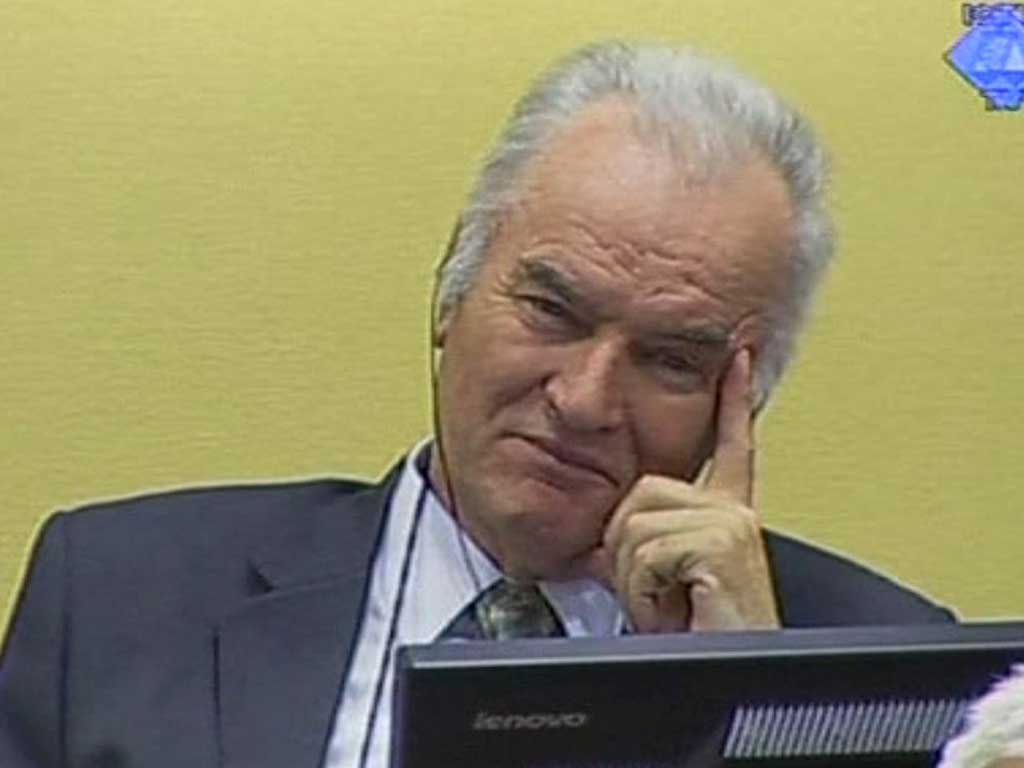Prosecution error sees Ratko Mladic trial delayed for months
Failure to release documents brings war crimes tribunal to halt after just two days

Your support helps us to tell the story
From reproductive rights to climate change to Big Tech, The Independent is on the ground when the story is developing. Whether it's investigating the financials of Elon Musk's pro-Trump PAC or producing our latest documentary, 'The A Word', which shines a light on the American women fighting for reproductive rights, we know how important it is to parse out the facts from the messaging.
At such a critical moment in US history, we need reporters on the ground. Your donation allows us to keep sending journalists to speak to both sides of the story.
The Independent is trusted by Americans across the entire political spectrum. And unlike many other quality news outlets, we choose not to lock Americans out of our reporting and analysis with paywalls. We believe quality journalism should be available to everyone, paid for by those who can afford it.
Your support makes all the difference.After waiting nearly 20 years for the war crimes and genocide trial of Ratko Mladic, the families of his alleged victims will have to wait some months more after the judge at the special court for the former Yugoslavia in the Hague yesterday suspended proceedings indefinitely after it transpired that the prosecution had failed to release thousands of documents to defence lawyers.
Judge Alphons Orie, who clashed with the former Bosnian Serb general on the opening day of proceedings on Wednesday after shouts from the public gallery, said he was delaying the war crimes case, "in light of the prosecution's significant disclosure errors".
"The chamber is still in the process of gathering information as to the scope and the full impact of this error," said the judge. "The chamber aims to announce the start date of the prosecutions evidence as soon as possible." The mistake is thought to have involved as many as 7,000 documents and prompted the defence to demand an immediate six-month adjournment.
The delay, which is almost certain to last several months whether or not the defence is granted its wish, will do little to assuage the victims' families. They fear that Mladic, who is thought to be in ill health, may not live long enough to see justice.
It remains unclear how and why the prosecution failed to disclose the documents in the case, but they are believed to relate to witness testimony that had been due to be heard in the coming weeks, before a scheduled summer break at the end of July. Prosecutors acknowledged the error "could impact on the fairness of the trial", said the court's spokeswoman, Nerma Jelacic.
The tribunal published a letter yesterday from prosecutors to Mladic's lawyer with the explanation that the missing documents were not uploaded on to an electronic database accessible to the defence. "We sincerely apologise for the inconvenience that these missing materials... may have caused to you," said the letter, dated 11 May.
Nonetheless, the oversight is a huge embarrassment for the court amid its most significant hearing since the aborted trial of the former Serbian president Slobodan Milosevic who died during his trial after several years of testimony. It represents a setback in the final trial to focus on the atrocities committed during the 1992-1995 Bosnian war, which left more than 100,000 people dead.
Before the postponement, prosecutors had finished their opening statement by recounting in chilling detail the systematic murder by Bosnian Serb forces commanded by Mladic of thousands of Muslim men and boys in Srebrenica in July 1995, Europe's worst massacre since the Second World War.
"In a period of only five days, from 12 to 16 July 1995, the armed forces of [Bosnian Serb leader] Radovan Karadzic and Ratko Mladic expelled the civilian population of Srebrenica and murdered over 7,000 Srebrenica men and boys," said prosecutor Peter McCloskey. Other estimates range up to 8,000 dead.
Mladic, the 70-year-old former commander of the Bosnian Serb army, showed no emotion, the Associated Press reported, as Mr McCloskey showed judges a video of what he said were the bodies of executed Muslim men piled in front of a bullet-riddled wall.
On the opening day of proceedings, Mladic earned a rebuke from the judge after gesturing to a woman in the public gallery by drawing his hand across his throat.
Join our commenting forum
Join thought-provoking conversations, follow other Independent readers and see their replies
Comments